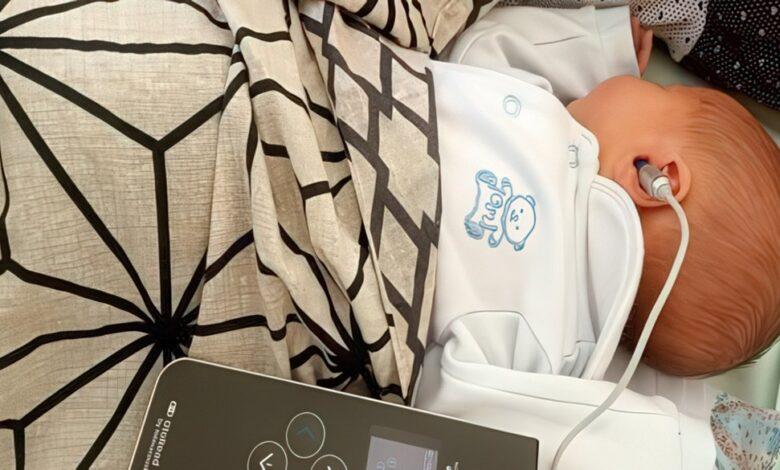Hearing in the first days of life: how babies are checked in Mykolaiv and why it is important

At a time when Ukrainian children suffer the greatest number of injuries, stress and losses in recent history, the issue of the health of newborns goes far beyond medical statistics. Babies born during war bear its invisible scars. Explosions, stress, loss of housing, injuries, fear and anxiety of pregnant women – all this leaves an impression on children even before they are born. Malformations are recorded more often, including those that are difficult to detect without special examinations. One of these is hearing.
Audiological screening of newborns in Mykolaiv
In Mykolaiv, a city that has repeatedly come under enemy fire, today a simple but extremely important procedure – audiological screening of newborns – has been introduced. About this reported in the City Health Department. Its purpose is to prevent hearing impairments from going unnoticed. After all, hearing is the basis of a child’s language, emotional and cognitive development. A deaf baby is not just silent. From the very beginning, it is deprived of an important tool for learning, socialization and interaction with the world.
All children born in maternity wards of Mykolaiv medical institutions undergo audio screening before discharge or at least during the first month of life. The procedure is completely voluntary, carried out with the consent of the parents. Doctors explain: the examination takes only a few minutes and does not cause any discomfort. The sensor, which is inserted into the baby’s ear, records the reaction of the hair cells of the cochlea to sound impulses. If the child is calm, asleep or has just eaten, the results are even more accurate.
And even if the first test does not give the expected result, this is not the final verdict. The probable cause is a blockage of the auditory canal, fluid in the ear, an imperfect reaction of the nervous system. In this case, the examination is repeated after several weeks. If abnormalities are detected even then, doctors proceed to deeper diagnostic methods. The main thing is not to miss time, because the effectiveness of the correction of hearing disorders directly depends on the age at which the problem was detected. In wartime conditions, this is one of the few tools through which doctors can really influence the quality of life of a child from the very first days.
What parents should pay attention to after discharge
Even if the initial screening is passed, it is important for parents not to ignore signs that may indicate hearing impairment. Especially in conditions when the child grows up in a stressful environment – with sirens, loud noises, frequent moves.
Here are some warning signs:
– at the age of 1-2 months, the child does not flinch and does not react to loud sounds (for example, slamming doors);
– at 3 months, the child does not turn his head in the direction of a familiar voice or sound;
– at 6 months does not make sounds in response (humming, babbling);
– at 9 months does not respond to the name or simple commands (“give”, “come here”);
– at 12 months, does not imitate sounds, does not pronounce even simple syllables (“ma-ma”, “ba-ba”).
If one or more of these points coincide, do not delay a visit to an otolaryngologist or audiologist. The earlier the problem is detected, the greater the chances of successful correction. In some cases, the use of a hearing aid is sufficient, in others, complex therapy and support from a speech therapist is required.
What else is important to know
In wartime conditions, it is especially dangerous to postpone the examination due to everyday difficulties or lack of resources. Children who do not receive timely help often have problems with socialization, learning, speech and even behavior in the future. After all, hearing disorders are often not obvious – the child is simply silent, does not hear prohibitions or does not understand, but no one suspects that the reason is not in character, but in biology.
Audiological screening is not a panacea, but an important step. Like a vaccination that does not save from everything, but gives a chance to survive. Especially now — in a country where even silence can only be temporary.





